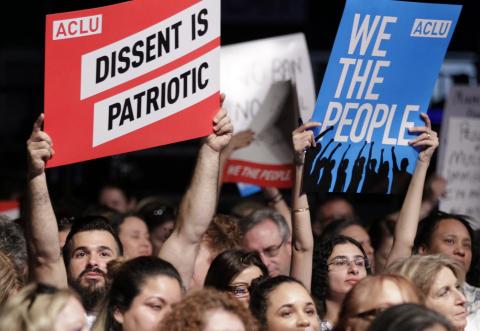The American Civil Liberties Union (ACLU) has added a new weapon in their arsenal to combat the Trump administration’s infringement on our civil rights – they call it People Power.
The ACLU, known for nearly 100 years as a legal advocate for protection of individual rights, now wants to take its efforts to the streets. With only 300 staff attorneys, the group has been the proverbial David fighting the government's Goliath of 19,000 lawyers.
On March 11, the ACLU held an event in Miami, streamed live to 200,000 people gathered nationwide at over 2,000 "house parties." The program was titled, "Resistance Training," and urged attendees to organize locally in support of the ACLU’s efforts to resist complying with the Trump administration's agenda.
ACLU Executive Director Anthony Romero, kicked off a series of speakers with an emotional plea for support. Romero described the battle as one worth fighting for – on the front lines of immigration, religious freedom, reproductive rights, and the First Amendment.
According to Romero:
"Democracy must never be a spectator sport. Our rights, the freedom of speech, the freedom of protest, the freedom to petition one’s government -- those are not just rights. In the Trump era, those are obligations."
Romero continued to describe how challenging the last four months have been since waking up the morning after the election. But the ACLU, he avowed, “was created for moments like this.”
The ACLU is kicking off this initiative with an appeal for local grassroots campaigns to create cities of resistance against President Trump – proclaiming them "Freedom Cities."
ACLU National Political Director Faiz Shakir described this effort and how it relates to immigration. The threats of mass deportation, he said, are making the lives of our friends and neighbors “a living hell.” Shakir spoke of how to fight back. “One of the strongest sources of our political power are towns and cities across the United States,” said Shakir.
The ACLU is promoting local community adoption of 9 model enforcement policies and rules for law enforcement. Shakir urged attendees to organize meetings with local law enforcement officials to discuss these draft ordinances. We want to "make our cities welcoming to all immigrants,” Shakir maintained.
According to handouts provided at the ACLU events, the policies are designed to defend against mass deportation, protect privacy, help redress abuses and protect immigrants and refugees from discrimination.
Some communities are already doing this, Shakir explained, and they "deserve a pat on the back; Some might need a little more persuasion."
Other ACLU representatives and attorneys at the event told people how to get involved, how to fight back, and how to resist – legally and protected by the constitution.
One speaker, ACLU attorney Lee Rowland, explained how the First Amendment protects, with certain restrictions, our right to exercise free speech on streets, sidewalks, and parks – public forum spaces, she called these venues. “Protesting in the street is a grand old American tradition,” Rowland stated.
She went on to give insight and tips on how to do this without crossing the legal line. The Women’s March – the largest protest in American history – did not result in a single arrest, according to Rowland. "That's incredible. That's an example of our democracy working exactly as it is supposed to,” she told the audience.
Public demonstrations, protests, and other efforts to resist, along with the ACLU's direct efforts in litigation and fights on Capitol Hill, are all part of a multifaceted response "to roll back the Trump administration’s worst abuses," according to the ACLU Freedom Cities Action Guide
Judging from the telecast reactions of attendees, the event was powerful and emotional.
Romero, on behalf of the ACLU, closed his remarks with this appeal: "Messy. Disruptive. Loud. That’s what democracy looks like. So let’s go show ‘em.”
